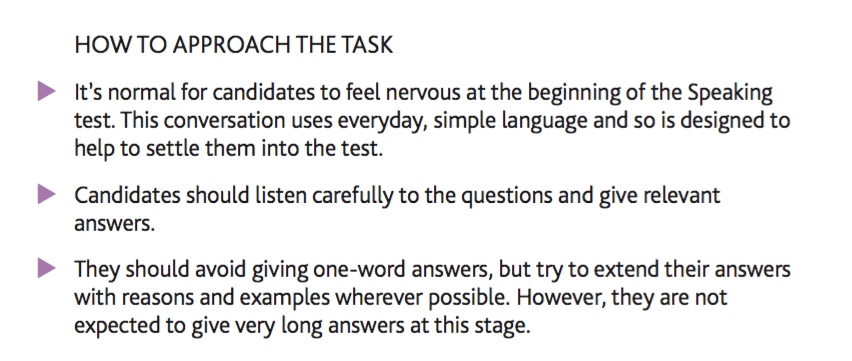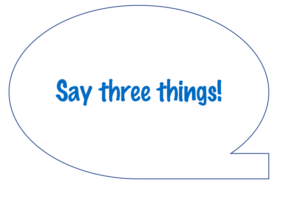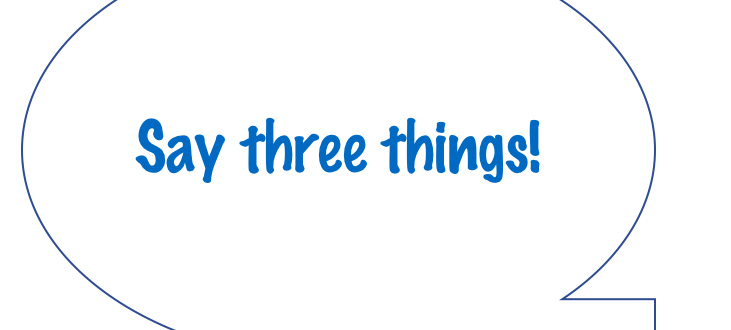Personal questions in A2 Key, B1 Preliminary, B2 First speaking tests : Say three things
Very often in Part 1 of the A2 Key, B1 Preliminary and B2 First speaking tests, candidates answer personal questions with very short answers.
Let’s look at the breakdown of this part of the speaking test, taken from the B1 Preliminary for Schools Handbook, available here.
This Part asks candidates to talk about themselves, in response to the interlocutor’s questions. Questions are about their personal details (family, home town, etc), daily routines (times, activities, etc), things they like and don’t like (food, hobbies, activities, places, etc).
These topics and question focuses appear at all levels of the Cambridge exams – right from Pre-A1 Starters up to C2 Proficiency.
What will change will be the wording of the questions, and, at higher levels, this can mean that students will be asked questions that perhaps they’ve never answered before! We’ll look at this in another post.

In the tips on how to approach this part, there are three points:
As well as settling candidates into the test and helping them feel relaxed and confident, it is important for students to know that this IS part of the test and language produced and the relevance and extent of responses will be assessed, as they will be in all parts of the speaking test.
I’d like to share some ideas to help train students to extend their answers.
Say three things

Let’s start by looking at two typical questions that often appear right at the start of speaking tests:
Personal information
How old are you?
Where do you live?
I train my students to try and give three answers.
Let’s look at some examples.
Interlocutor: How old are you?
Candidate: I’m eleven years old. My birthday is in February. I’m the youngest in my family.
Interlocutor: Where do you live?
Candidate: I live in a flat. It’s in the centre of Santander. The flat’s on the fourth floor.
Although generally, we should not tell students to use pre-prepared answers, I think that in this case, it could allow them to start their speaking test confidently and fluently.
By training students to think of three things, hopefully, their answers will be more interesting too – and this could help them in real life!
So, in class, why don’t you give students time to prepare three answers to some typical questions?
I’ve given you my three answers to each question so you can see what I mean.(the questions are from the A2 Key and A2 Key for Schools Handbooks)
Questions
1 Who do you live with?
2 How many bedrooms are there in your house?
3 Where do you watch TV at home?
4 What’s your favourite room in your house?
My answers
1 I live with my husband. Our two daughters don’t live with us now. They live in Madrid and in Barcelona.
2 There are three bedrooms. Our bedroom is downstairs. The other two bedrooms are upstairs.
3 As a family, we watch TV in the living room. I sometimes watch TV or videos on my laptop, But I prefer listening to music.
4 That’s a difficult question!* It depends!** I like the living room. I enjoy cooking, so the kitchen is a nice room to be in. I also love our garden, but that’s not a room, is it?
Thinking time for tricky questions!
For the last question, I’ve also used a useful sentences for giving myself more thinking time – a useful thing to do when the interoclutor asks a question that you’ve never answered before!
That’s a difficult question! or That’s a good question!
Extending with alternatives
And another useful sentence for then extending your answer is It depends!
When we use that sentence, it means that at least two ideas are going to follow!
After students have prepared their three answers, regroup them and they can ask and answer the questions.
In feedback, you could ask them questions that involve processing, remembering.
For example:
What new thing(s) did you find out about your classmates?
Which answers were the same? Which were different?



Pingback : Teaching Together Practising for A2 Flyers Speaking Test Part 4 - Teaching Together
Pingback : Teaching Together How to do well in B1 Preliminary Speaking Part 2 - Teaching Together